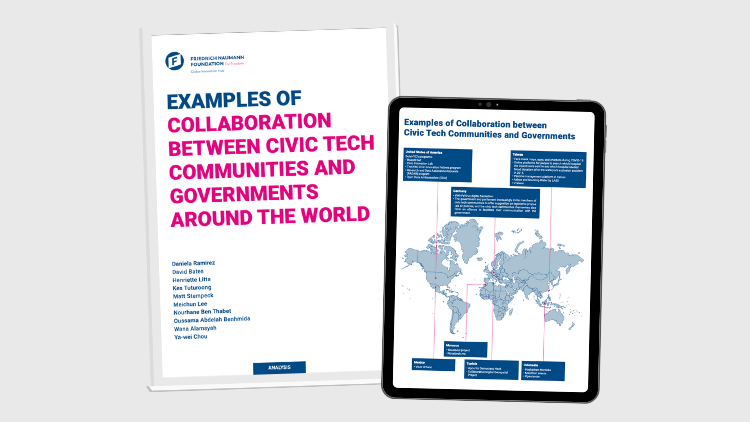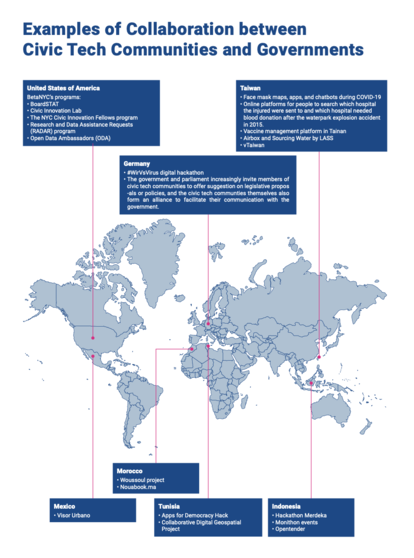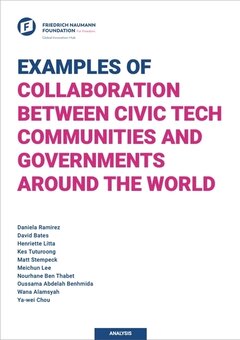Innovation for Democracy
Explore Examples of Collaboration between Civic Tech Communities and Governments Around the World

FNF Global Innovation Hub just released “Examples of Collaboration between Civic Tech Communities and Governments Around the World” publication. Be the first one to learn innovative initiatives around the world by downloading the publication before our releasing event at Hacking Democracy Conference on Oct 27!
Every day, people use digital services provided by governments. On a normal day, people may use online government systems to pay taxes or express their opinions on public policy; on a special occasion, such as the outbreak of Covid-19, it may be an app created by governments to book a vaccination appointment or get the latest instructions on pandemic prevention. Sometimes people appreciate the digitization of these government services, sometimes they are not. For example, a tax filing system that only works with Internet Explorer or a specific browser is not going to make people happy. Moreover, in authoritarian countries, people may encounter something more serious than a poorly designed government system: a surveillance tool may be installed in a government app, and everyone in the country is required to install the app on their mobile phones. And, of course, no one is allowed to see the source code of the app.
As is often the case with the digitization of services, there is a general awareness of the dangers. And while vigilance is certainly good and appropriate, it is equally important not to ignore the opportunities that digitization offers. This is why we launched the publication “Examples of Collaboration between Civic Tech Communities and Governments Around the World”: to explore more ideas that encourage governments around the world to work with citizens to co-create digital services. By involving citizens, governments can ensure that the design and operation of public digital services meet people's needs. People will be able to review these digital services to know whether they meet an ideal standard of quality, cybersecurity, privacy, accessibility, and transparency. Governments and the public can also inspire each other to innovate approaches to digital service delivery, thereby improving existing services.
Examples of Collaboration Around the World
We invited experts from different regions to contribute their experience and observations to this publication: Daniela Ramirez and David Bates from Mexico, Henriette Litta from Germany, Kes Tuturoong and Wana Alamsyah from Indonesia, Matt Stempeck from the United States, Meichun Lee from Taiwan, Nourhane Ben Thabet from Tunisia, Oussama Abdelah Benhmida from Morocco. You can learn more about them from our Hacking Democracy Conference event introduction page. The examples they presented cover a wide range of topics: fighting corruption, increasing transparency in government procurement, land management, pandemic prevention, improving digital literacy of governments and communities, local democracy, citizen participation, and making a city more accessible for people with physical disabilities. We have summarized the examples they presented in the map below, and encourage you to read their case studies to discover the inspiring stories of how citizens and governments can work together behind these examples.

What Needs to Be Done to Facilitate Such Collaboration?
After presenting examples from around the world, our experts also offered a number of important and practical policy recommendations on how to facilitate such collaboration between civic tech communities and governments. We have distilled their recommendations into the following five points:
- Governments should offer more support to civic tech, such as funding, improving regulations, institutional support, and flexible policy initiatives such as sandbox for encouraging innovation of civic tech.
- Governments should enhance digital literacy of public servants and increase its support to those public servants who actively reach out to civic tech communities.
- Governments should consistently adopt the concept and standard of open data to public data in various fields since open data is seen as an infrastructure to inspire more collaboration.
- The collaboration between civic tech communities, citizens, and governments should be based on openness, trust, participation, and equality.
- Governments should improve relevant laws and regulations by reducing unnecessary bureaucratic procedures and actively establishing a supportive and clear legal framework that encourages civic tech communities to innovate and collaborate with governments.
Our Expectation
By curating experiences from around the world, we hope this publication will inspire more collaboration between governments, civic tech communities, and citizens. At a time when digital tools are advancing at a pace that no one can stop, civic tech communities have an important role to play in ensuring that governments and citizens have a similar level of technological literacy when discussing the design of digital public services. This is very important if people do not want to see more public digital services that fail to meet people's needs or even become tools for governments to control citizens. Furthermore, the participation of civic tech communities and the public can improve the efficiency and quality of digital public services, because their participation will provide governments with more innovative ideas to improve public services, and this is an inevitable strength to increase the resilience of democracy.
Would you like to learn more and discuss directly with the authors of this publication? Come register for our Hacking Democracy Conference on Oct 27 by clicking here, we will hold a releasing event there by inviting all the authors to present their studies!

